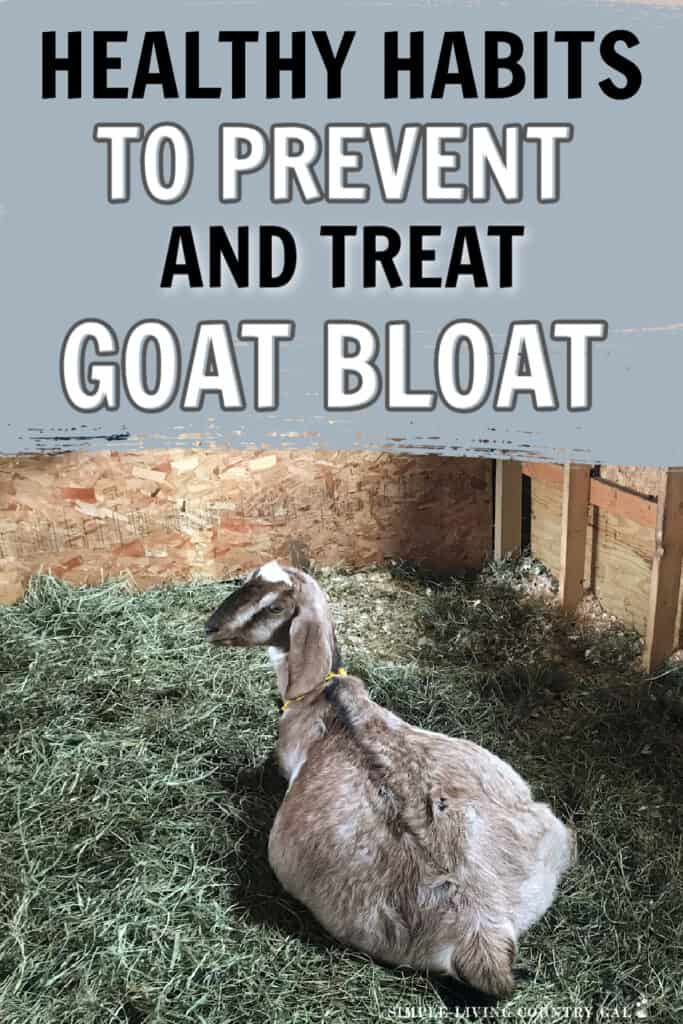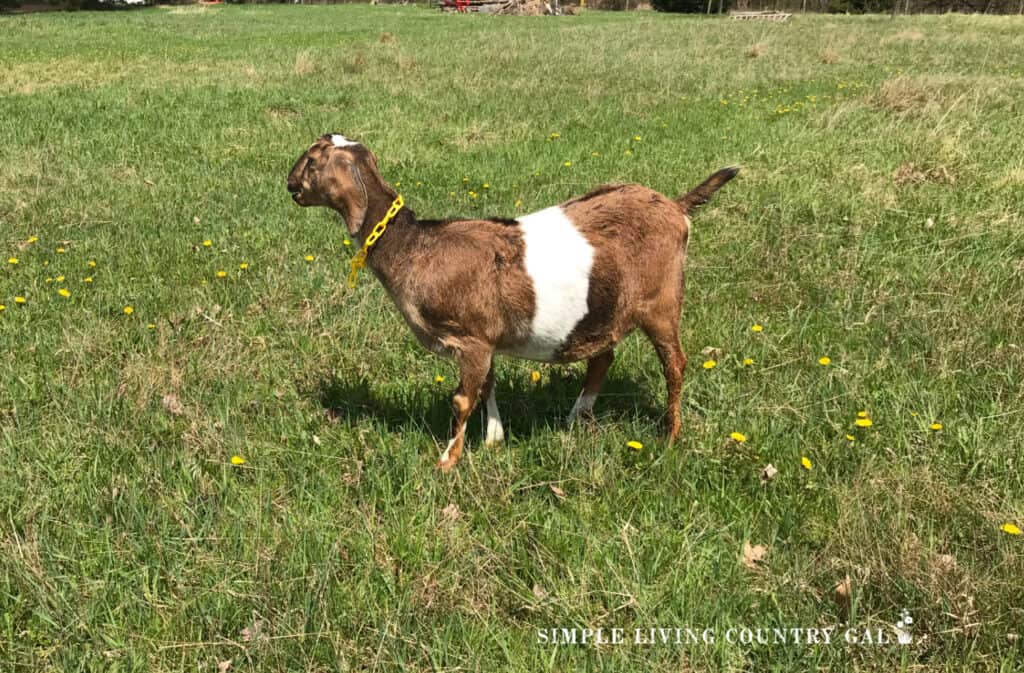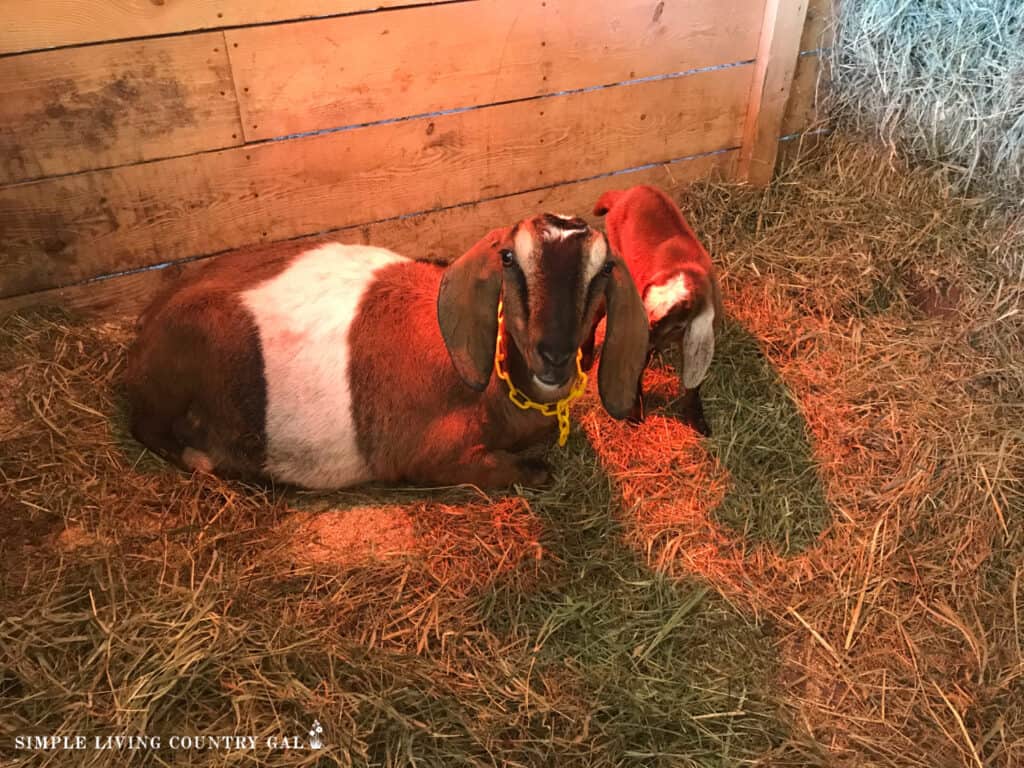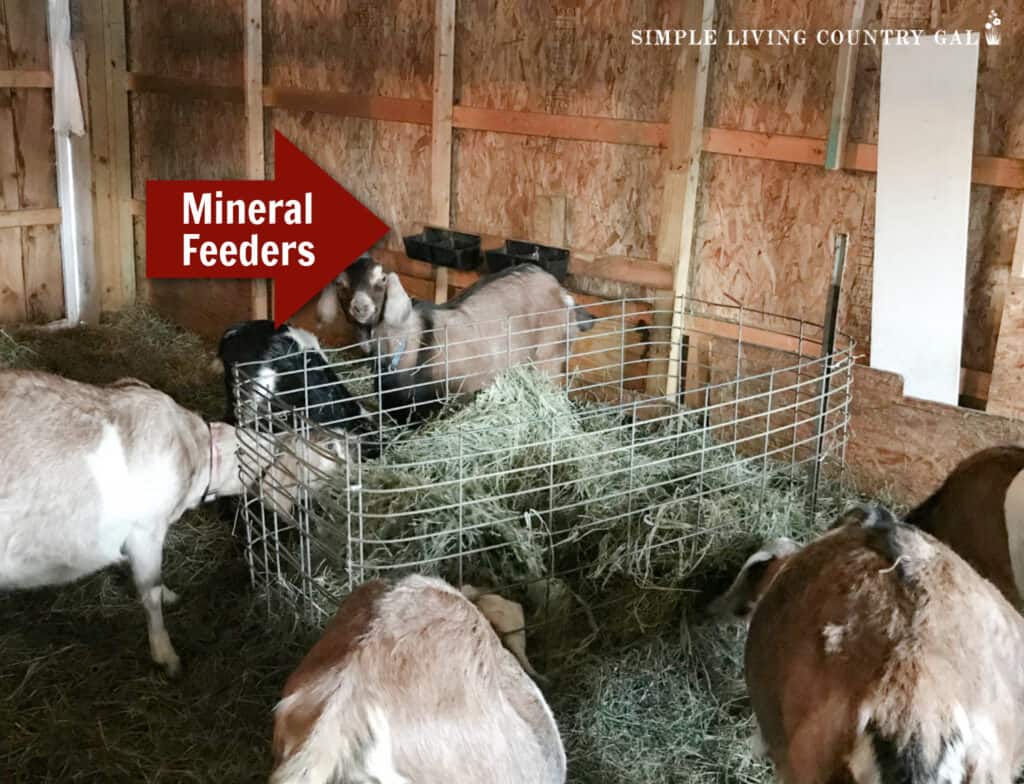how to treat a bloated goat
This guide on how to treat a bloated goat will give you tips on how you can get them back on their feet again.
Raising goats can be such a fun, rewarding experience, especially dairy goats. Who doesn’t love fresh milk every day from their own herd? But, when raising animals, sometimes issues come up, such as bloat.
Our goal is to help you learn how to raise dairy goats that are healthy and vibrant, giving you milk and entertainment year-round.

If you are a goat owner, you know how quickly bloat can take over and wreak havoc on your animals’ health. Bloat is the buildup of gas in the stomach that can cause severe pain and even death for goats if left untreated. Unfortunately, it can be common among goats and something you will want to watch out for.
What is bloat?
Bloat is a condition that occurs when gas accumulates in the rumen, the first stomach chamber of a goat. This buildup can be caused by several things, including overeating, eating too fast or consuming something toxic like moldy feed.
This is why it is important to ensure your grain is in a container and away from your goats. I have known a few friends who got into the grain bin that caused a serious case of bloat. A simple mistake that turned into a deadly one quickly.
Goats with bloat will look very round in the middle and move and act as if they are uncomfortable. You may notice them moving very slowly preferring to lye down rather than walk around.
Some goats with bloat may bite and kick at their stomach or stretch out their necks. You will want to catch bloat as it can lead to more serious issues like reduced blood flow and compromised breathing if left untreated.
Be sure to grab the FREE Goat Health Checklist below!!
How bloat affects a goat’s digestive system
When a goat’s rumen becomes too full of gas, it can put pressure on their other organs and reduce blood flow to the vital areas. This can lead to a decrease in appetite and a noticeable slump in energy. It can also cause damage to the lining of the stomach.
If bloat is severe enough, it can interfere with breathing that can range from labored breaths to possible suffocation. Even though death by bloat is not very common, it is important to know what can happen so you can act quickly.

Symptoms of bloat in your goat
Let’s recap the list of symptoms that will alert you that there is a change in your goat is dealing with bloat.
- A large round stomach
- A stomach that is hard like a basketball when touched
- Changes in behavior
- Loss of appetite
- Standing still or a reluctance to move
- Reduced energy levels
- Decrease in milk production
If you suspect your goat is experiencing bloat, you will want to contact your veterinarian immediately for guidance and treatment. While there are some general remedies that can be given in mild cases of bloat, it’s important to have a vet assist, especially if the bloat is severe.
Call your vet for advice. Many times they will walk you through what to do over the phone, giving you a chance to treat yourself before telling you to bring your animal in.
Disclaimer: In accordance with FDA guidelines, the information and products offered on this website are not intended to diagnose, treat, cure, or prevent any disease. I am not a medical professional. Before administering any medications to your animals please contact a veterinarian first.
How to Treat Bloat
If you notice your goat is showing symptoms of bloat, it’s important to act quickly and treat them right away. Here are some steps to follow when treating a bloated goat:
- Remove any food sources to prevent them from eating more and making their condition worse.
- Gently massage the goat’s stomach to help move the gas around and relieve any pressure.
- Lead your goat to walk them around; this can sometimes help to move the gas in the stomach.
- If your goat is still uncomfortable after these steps, it’s best to call a veterinarian for further treatment options or advice. They may suggest using a drench tube to remove excess gas from the rumen or administering medication such as mineral oil to help move things along.

How to Prevent Bloat
As mentioned earlier, prevention is key when it comes to bloat in goats. Luckily there are many things you can do to encourage a healthy and hardy herd.
#1. Feed your goats small meals throughout the day instead of one large meal to prevent them from overheating and causing a buildup of gas. This is especially important for goats consuming high-grain diets.
#2. Avoid sudden changes in diet, as this can upset the balance of bacteria in the rumen and lead to excess gas production. If you need to make dietary changes, do so gradually over a week or two.
#3. Provide fresh, clean water at all times to help keep the rumen functioning properly. Dehydration can contribute to bloat in goats.
#4. Avoid feeding your goats on the ground to reduce their risk of ingesting dirt or other foreign objects that can disrupt the balance of bacteria in the rumen.
#5. Monitor your goats for signs of illness and treat any underlying conditions promptly to prevent them from developing into bloat.
#6. Keep your goats active and provide adequate space for them to move and exercise. Exercise helps stimulate the rumen and promote healthy digestion.
#7. Consider adding a small amount of baking soda to your goat’s diet as a preventative measure against bloat. Baking soda can help neutralize excess acid in the rumen, reducing the risk of bloat.
You can leave baking soda out free-choice so it is there if they need it. It amazes me that livestock will naturally go to baking soda to help them with stomach issues, that instinctively know what will help, and by having it out, they can access it whenever they need to.

#8. Regularly deworm your goats to prevent the buildup of parasites, which can contribute to bloat. Work with your veterinarian to develop a deworming schedule that is appropriate for your herd.
#9. Educate yourself and other goat owners about the signs and prevention of bloat in order to catch it early and prevent it from becoming a serious issue.
Bloat can be a serious and potentially deadly condition for goats if left untreated. By following these preventative measures you can help stop things before they get out of hand.
Be slow with any diet changes, always have clean water out, include things for your goats to climb on, and add a deworming routine to your schedule, and you can keep the risk of bloat to a minimum.
More Goat Care Resources:
- Feeding Kelp to Your Animals
- What is the Best Hay to Feed Goats
- What are the Best Minerals for Goats
